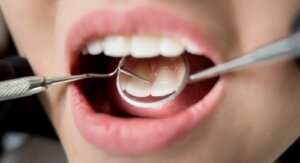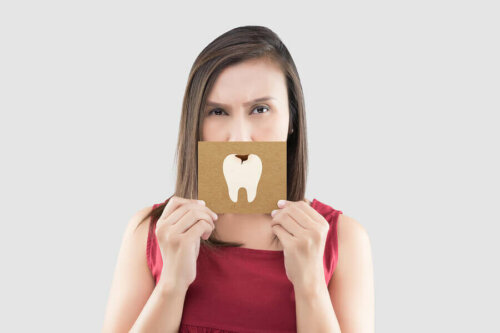7 Consequences of Poor Dental Hygiene for Your Health

Oral health is more important than some people think. In fact, it’s linked to the general well-being of the whole body. That is why the consequences of poor dental hygiene could be extremely harmful.
Good oral and dental hygiene habits are indispensable. A white smile and fresh breath are fundamental elements of personal image and, in turn, taking care of your mouth is an important element of good health.
How is oral health linked to the health of the rest of the body?

Like many areas of the human body, the mouth is full of bacteria, many of which are harmless to health. Natural defenses and good oral hygiene practices are usually enough to keep them under control.
However, without proper care, bacteria can cause infections in the mouth, which can lead to tooth decay and gum disease. In the worst cases, other conditions can even develop.
The common causes of oral diseases
According to the World Health Organization (WHO), there are four risk factors associated with most oral diseases:
- Poor health
- Smoking
- Poor oral hygiene
- Consumption of alcoholic beverages
In fact, the WHO explains that these factors are related to the three most important chronic diseases: cancer, cardiovascular diseases, and chronic respiratory diseases. This doesn’t mean that poor dental hygiene directly triggers these problems, but that it “might.”
The occurrence of these health complications varies by geographic region, as well as by access to and availability of oral health-related services. Similarly, some social characteristics play a role. However, poor dental hygiene is cited as one of the main causes of these problems. The consequences of these bad habits are reviewed below.
We think you may also enjoy reading this article: 9 Natural and Effective Tips for Taking Care of Your Teeth
7 consequences of poor dental hygiene

1. Cavities
Cavities are one of the most frequent oral conditions, especially in children. The U.S. National Library of Medicine explains that cavities are the destruction of the tissues that make up the teeth. This is due to acids produced by plaque bacteria on the tooth surface. The following factors influence the appearance of caries:
- Food
- Hygiene habits
- Genetic inheritance
- Presence of fluoride in salt and toothpaste
According to WHO figures, between 60 and 90 % of school-age children have cavities, as do almost all adults. They are often accompanied by pain and other discomforts.
2. Periodontal disease
Also known as gum disease, this is an infection of the tissues that hold teeth in place. It occurs, in general, due to poor dental hygiene habits that cause plaque to accumulate and harden on the teeth, as several studies have shown.
In its more advanced stages, it can cause pain and bleeding in the gums, pain when chewing, and tooth loss. The WHO estimates that between 15 and 20% of adults between 35 and 44 years of age have lost teeth due to this disease.
3. Poor dental hygiene and halitosis
Bad breath is mainly caused by an accumulation of bacteria in the mouth.
Bad breath is caused by bacterial accumulation inside the mouth, although in some cases it has another origin. This is one of the mildest problems caused by poor dental hygiene, although one of the most annoying.
Data collected by the Spanish Society of Periodontology and Osseointegration (SEPA) estimate that 90 % of cases of halitosis are the result of poor oral hygiene. Seventy percent is due to bacteria found on the back of the tongue and 30 percent to gum problems.
These first three diseases are direct consequences of inadequate oral care habits. However, there are other more delicate conditions related to oral health.
Like this article? You may also like to read: LED Teeth Whitening: Advantages, Disadvantages, and Care
4. Endocarditis and poor dental hygiene
This is an infection of the inner lining of the heart, also known as the endocardium. It’s usually due to a bacterial and sometimes fungal infection that occurs when bacteria enter the bloodstream from another part of the body, such as the mouth. They then reach the heart and attack the vulnerable areas.
5. Cardiovascular disease
In 2008, a Bristol University study concluded that people who suffer from gingivitis, a result of poor dental hygiene, are more likely to suffer from heart disease.
The research showed that bacteria found in the mouth can enter the blood system and latch onto platelets, which could lead to blood clots and subsequent heart attacks.
6. Preterm birth
Research has linked periodontitis to preterm birth and low birth weight in newborns. This t is a risk factor during pregnancy. This dental disease causes the release of prostaglandins, the hormones responsible for contractions during labor.
7. Chronic diseases due to poor dental hygiene
Some chronic diseases are worsened by poor oral health.
Inadequate dental hygiene may have some influence on the development of several degenerative diseases, among them:
- Diabetes
- Alzheimer’s disease
- Osteoporosis
How to improve your oral health
The first thing is to adopt good dental hygiene habits, including brushing, flossing, and using mouthwash. Likewise, you should avoid the consumption of tobacco and alcohol in excess.
Finally, it’s essential to visit a dental professional periodically. In this way, there will be adequate control of your dental health, and any inconvenience can be treated in a timely manner.
All cited sources were thoroughly reviewed by our team to ensure their quality, reliability, currency, and validity. The bibliography of this article was considered reliable and of academic or scientific accuracy.
- OMS | Salud bucodental. https://www.who.int/es/news-room/fact-sheets/detail/oral-health
- https://www.sepa.es/images/stories/SEPA/ESTAR_al_DIA/HALITOSIS/InformeHalitosis.pdf
- Fröhlich, H., Herrmann, K., Franke, J., Karimi, A., Täger, T., Cebola, R., … Frankenstein, L. (2016). Periodontitis in Chronic Heart Failure. Texas Heart Institute Journal. https://doi.org/10.14503/THIJ-15-5200
- Mancini, M., Grappasonni, I., Scuri, S., & Amenta, F. (2010). Oral health in Alzheimer’s disease: a review. Current Alzheimer Research. https://doi.org/10.2174/156720510791162359
- MedlinePlus. Caries. https://medlineplus.gov/spanish/toothdecay.html
- Rev. Clin. Periodoncia Implantol. Rehabil. Oral vol.9 no.2 Santiago ago. 2016. Enfermedades periodontales como un problema de salud pública: el desafío del nivel primario de atención en salud. https://scielo.conicyt.cl/scielo.php?script=sci_arttext&pid=S0719-01072016000200016
- MedlinePlus. Endocarditis. https://medlineplus.gov/spanish/endocarditis.html
- Universidad de Bristol. Bleeding gums increase risk of heart disease. https://www.bristol.ac.uk/news/2008/5880.html
- Avances en Periodoncia vol.16 no.2 Madrid ago. 2004. Relación entre enfermedad periodontal y parto prematuro. Bajo peso al nacimiento: una revisión de la literatura. http://scielo.isciii.es/scielo.php?script=sci_arttext&pid=S1699-65852004000200004
This text is provided for informational purposes only and does not replace consultation with a professional. If in doubt, consult your specialist.








